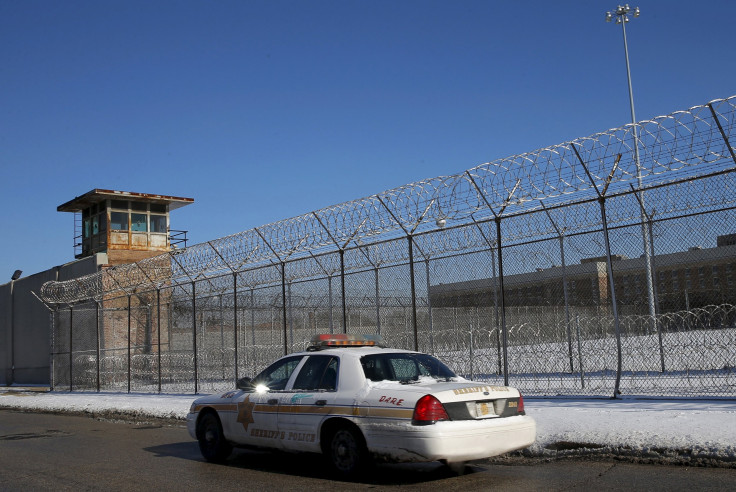What If You Can't Afford Bail? A Few Large Companies Rake In Billions In Bond Business

Long before a person arrested and charged is found guilty or innocent, they face a choice with myriad consequences: Find a way to post bail, the median of which the Justice Department pegs at $10,000, until they show up to court to get their money back, or wait in jail, making a post-trial sentence an estimated three or four times likelier. There is another option for the generally low-income and disproportionately African American or Hispanic people who make up the 467,000 pre-trial detainees in the U.S., and a few global corporations are raking in billions from it.
Detainees awaiting their court dates can pay a non-refundable fee — usually worth 10 percent of the required bail but varying by state — to a bail bond agent or insurance company that will post the bail but leave the arrested person’s family to pick up the tab if the individual doesn’t show up to court. Just nine of the biggest bail insurers backed the majority of around $14 billion worth of bail bonds issued in the U.S. in 2016, according to a study released last week by the American Civil Liberties Union and the advocacy group Color Of Change.
The use of for-profit bail bonds has escalated over the past several decades, to 49 percent from just under a quarter of bail releases in 1990, according to the report. Defenders of the practice, which is only used in the U.S. and the Philippines, point to saved taxpayer dollars and research indicating that defendants released on bail bonds are 28 percent less likely to avoid appearing in court and 53 percent less likely “to remain at large for extended periods of time.” But plenty of other research takes into account the exorbitant costs of housing those detainees, many of whom are completely innocent in the first place.
“In reality, taxes do pay for it — we spend billions of dollars to incarcerate people,” said Chiraag Bains, a senior fellow at Harvard Law School’s Criminal Justice Policy Program. Either way, he added, “we should have a justice system that we are morally comfortable with paying for.”
The way state and local courts determine bail, Bains added, is flawed in itself, and contributes to a vicious cycle in which already-impoverished and relatively higher-crime communities are drained of resources and pushed toward criminal behavior and incarceration.
“Bail is supposed to be about release, but in reality it keeps people locked in because they can’t afford to pay,” he said. “The expectation is, ‘Make some calls, find someone who can pay for you.’ But that’s not the point. They’re supposed to assess your ability to pay, not your extended family’s ability to pay for you.”
Such disconnect between the assessed ability to pay and the detainees’ actual financial resources, he added, may even violate the 14th Amendment.
The top corporations with ownership of the insurers, as detailed by the ACLU/Color Of Change study, were worlds away from the communities they directly impacted. Namely, Tokio Marine America and Fairfax Financial Holdings Ltd. each own several sureties. The former, a Japan-based property and casualty insurer, earned $40 billion worldwide in 2016, while the latter, which is based in Toronto, earned $10 billion, the ACLU and Color Of Change found. By contrast, the regions affected by the money bail system — as studied on a granular level by researchers in Maryland and New Orleans, for example — are often predominantly poor and African American.
“The issue with money bail in this country is not an issue of guilty or not guilty, but rich and poor,” said Rashad Robinson, Color Of Change’s executive director. “You’re better off being rich and guilty than poor and innocent.”
Most firms in the business are represented by the American Bail Coalition, whose political contributions tripled to $1.2 million from 2012 to 2014, according to the report.
As most of these pre-trial detainees are imprisoned under state authorities, much of the campaign finance and lobbying activities take place at that level, Robinson noted. Political contributions by the money bond industry between 2010 and 2016 reach, in some states, hundreds of thousands of dollars, with Texas politicians receiving the highest amount, $322,765, Maryland candidates winning the second-highest, $309,762, and Florida coming in third, with $296,921, according to the study. And those figures are nothing new, according to a Justice Policy Institute report that documented state-level campaign funding by the money bail industry from 2002 to 2011. While the administration of President Donald Trump leans tough on crime, Attorney General Jeff Sessions’ recent order to U.S. attorneys to take a stricter stance on drug offenders may not have much of an impact, as most of those facing steep bail payments are detained in state and municipal jails.
Attorney General Jeff Sessions's memo reversing Obama-era charging policies for low-level drug offenders. https://t.co/sNfdgEadZo pic.twitter.com/GTaXEuLcNa
— Keith Boykin (@keithboykin) May 12, 2017
Robinson described the local nature of the issue as both an obstacle and an advantage for advocates of detainees’ rights.
“It’s challenging, because we’ve got to do this work around the country in different places, with all different laws,” he said. “But we can push against it. There is strength in the local community to push for change that will de-carcerate our communities.”
© Copyright IBTimes 2024. All rights reserved.






















